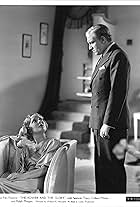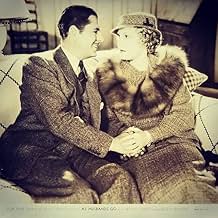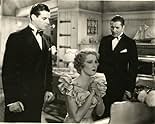Helen Vinson(1907-1999)
- Actress
Texas-born Helen Vinson was born Helen Rulfs in Beaumont on September
17, 1907, the daughter of an oil company exec.. The family eventually
settled in Houston, where her inflamed passion for acting was first
ignited. While in her teens she married Harry N. Vickerman, a man
fifteen years her senior who came from a well-to-do Philadelphia
family. Although she was not accepted into the drama department of the
University of Texas. She persevered by earning parts in local theater
productions. She eventually made her Broadway debut in a walk-on role
in a production entitled "Los Angeles" (1927). The stock market crash
of 1929 ruined her husband's business and the stress and anguish
precipitated divorce proceedings after only five years. Helen gained
further notice on Broadway in "Berlin" starring Sydney Greenstreet and "The Fatal
Alibi" (1932) with Charles Laughton. During this time she was also noticed by
Warner Brothers talent scouts who ushered the svelte blonde straight to
Hollywood.
A chic, elegant beauty with a tinge of a Southern drawl, she played both lead and support roles in pre-Code films. Making a strong impression trading insults as the aloof "other woman." Often unsympathetic, self-involved and frequently bitchy and backstabbing. She was not above using her feminine wiles to get her way. She played Kay Francis' epicurean friend in the mild comedy Jewel Robbery (1932), and stood between Loretta Young and David Manners happiness as his wealthy fiance in the soap-styled drama They Call It Sin (1932). In the classic I Am a Fugitive from a Chain Gang (1932), she had a rather bland "nice girl" role as the stylish woman Paul Muni leaves Glenda Farrell for. Appearing opposite a number of diminutive male stars such as Muni, Edward G. Robinson, James Cagney and George Raft, whom she danced with in Midnight Club (1933), the almost 5'7" actress was not too popular with the so-called vertically-challenged leading men at Warners and was quickly released from her contract.
Earlier (in 1931) she had earned major Broadway notice as the female lead in the fantasy "Death Takes a Holiday" playing a woman who literally faces Death (played by Philip Merivale). Both she and Merivale missed out on recreating their roles in the 1934 film version when the parts instead went to Fredric March and Evelyn Venable. More film work came Helen's way alongside some of Hollywood's most popular and virile leading men. She played Warner Baxter's castoff wife in Frank Capra's Broadway Bill (1934) and Gary Cooper's problematic mate in The Wedding Night (1935). She appeared with Charles Boyer in Private Worlds (1935); Humphrey Bogart in Two Against the World (1936); James Cagney in Torrid Zone (1940) and even lightened it up a little bit in the Bob Hope/Paulette Goddard comedy Nothing But the Truth (1941). One of Helen's best known film roles, however, came with the plush drama In Name Only (1939) starring Cary Grant and Carole Lombard. In this vintage soaper, Vinson plays a close confidante to the highly manipulative and rancorous Kay Francis, who is married to Grant, who has in turn fallen in love with good-hearted Lombard.
When Helen married the British Wimbledon tennis champion Fred Perry, in 1935. She moved to England for a time. While there she made the films Transatlantic Tunnel (1935), King of the Damned (1935) and Love in Exile (1936), which resulted in little fanfare. They relocated to Los Angeles a couple years later so she could find more work. Perry also hoped he could parlay his sports fame into a movie career. Their highly publicized marriage was short-lived, however. Lasting only five years. After marrying her third husband, stockbroker Donald Hardenbrook, in 1945. Helen gave up her career completely according to the wishes of her husband. The couple remained together until his death in 1976. She had no children from her three marriages. After her retirement, she found varied interests including interior design. For the remainder of her life. She divided home life between Chapel Hill, North Carolina and Nantucket Island, Massachusetts. Helen passed away in Chapel Hill in 1999 of natural causes at the age of 92.
A chic, elegant beauty with a tinge of a Southern drawl, she played both lead and support roles in pre-Code films. Making a strong impression trading insults as the aloof "other woman." Often unsympathetic, self-involved and frequently bitchy and backstabbing. She was not above using her feminine wiles to get her way. She played Kay Francis' epicurean friend in the mild comedy Jewel Robbery (1932), and stood between Loretta Young and David Manners happiness as his wealthy fiance in the soap-styled drama They Call It Sin (1932). In the classic I Am a Fugitive from a Chain Gang (1932), she had a rather bland "nice girl" role as the stylish woman Paul Muni leaves Glenda Farrell for. Appearing opposite a number of diminutive male stars such as Muni, Edward G. Robinson, James Cagney and George Raft, whom she danced with in Midnight Club (1933), the almost 5'7" actress was not too popular with the so-called vertically-challenged leading men at Warners and was quickly released from her contract.
Earlier (in 1931) she had earned major Broadway notice as the female lead in the fantasy "Death Takes a Holiday" playing a woman who literally faces Death (played by Philip Merivale). Both she and Merivale missed out on recreating their roles in the 1934 film version when the parts instead went to Fredric March and Evelyn Venable. More film work came Helen's way alongside some of Hollywood's most popular and virile leading men. She played Warner Baxter's castoff wife in Frank Capra's Broadway Bill (1934) and Gary Cooper's problematic mate in The Wedding Night (1935). She appeared with Charles Boyer in Private Worlds (1935); Humphrey Bogart in Two Against the World (1936); James Cagney in Torrid Zone (1940) and even lightened it up a little bit in the Bob Hope/Paulette Goddard comedy Nothing But the Truth (1941). One of Helen's best known film roles, however, came with the plush drama In Name Only (1939) starring Cary Grant and Carole Lombard. In this vintage soaper, Vinson plays a close confidante to the highly manipulative and rancorous Kay Francis, who is married to Grant, who has in turn fallen in love with good-hearted Lombard.
When Helen married the British Wimbledon tennis champion Fred Perry, in 1935. She moved to England for a time. While there she made the films Transatlantic Tunnel (1935), King of the Damned (1935) and Love in Exile (1936), which resulted in little fanfare. They relocated to Los Angeles a couple years later so she could find more work. Perry also hoped he could parlay his sports fame into a movie career. Their highly publicized marriage was short-lived, however. Lasting only five years. After marrying her third husband, stockbroker Donald Hardenbrook, in 1945. Helen gave up her career completely according to the wishes of her husband. The couple remained together until his death in 1976. She had no children from her three marriages. After her retirement, she found varied interests including interior design. For the remainder of her life. She divided home life between Chapel Hill, North Carolina and Nantucket Island, Massachusetts. Helen passed away in Chapel Hill in 1999 of natural causes at the age of 92.































